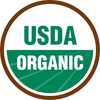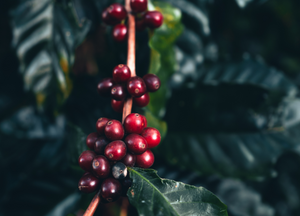Maybe you’re standing in the coffee aisle, holding two similar looking bags with just one difference — one is labeled “organic” with a slightly higher price tag asking yourself is organic actually worth it?
Are they actually delivering on fewer chemicals? Higher quality? Is it actually better for the planet?
Or am I just paying for a marketing buzzword?
But here’s the truth: the organic seal isn’t about marketing. It’s about what goes into your body and what’s left out.
What does “organic coffee” really mean?

When you see organic on a bag of coffee, it’s a USDA certification. That certification confirms the beans were grown without synthetic pesticides, herbicides, or fertilizers, and the farm avoids genetically modified organisms (GMOs). THAT’S RIGHT. Organic ALSO means Non-GMO.
Organic vs. conventional coffee

Conventional coffee is typically grown in full sun to boost the amount of beans produced and uses synthetic chemicals to manage weeds, pests, and soil health. Some of those chemicals, like glyphosate or cypermethrin, have raised red flags when it comes to long term health. At the point, we pretty much know that they are linked to cancer.
Organic coffee takes a different route. Certified organic farms are required to avoid synthetic pesticides, herbicides, and fertilizers. Instead, they rely on approved natural inputs and ecological management practices that reduce chemical exposure and limit environmental harm.
Organic coffee is:
-
grown without synthetic pesticides, herbicides, or fertilizers
-
uses natural pest control and organic-approved soil inputs
-
managed to limit harm to surrounding ecosystems like rivers and wildlife habitats
-
does not use genetically modified organisms (GMOs) in any part of the growing process
The result is a cleaner cup — for you, and for the environment where your coffee is grown.
Is organic coffee healthier?

Short answer, yes, especially when it comes to reducing your exposure to synthetic pesticides. Coffee is more likely than any other crop to contain pesticides.
Maybe you didn’t know, but coffee is one of the most chemically treated crops in the world. And unlike fruits or vegetables, coffee beans aren’t peeled or rinsed before brewing so whatever’s used during farming can linger into your daily cup. For something most of us drink every single day, that adds up.
Even if you’re not actively trying to “detox” your routine, reducing exposure to chemicals is a smart move, especially when they’ve been linked to serious health concerns like:
-
Hormone disruption, which can affect metabolism, mood, and reproductive health
-
Chronic inflammation, a root contributor to heart disease, autoimmune issues, and fatigue
-
Gut microbiome imbalance, which may influence digestion, immunity, and even mental health
-
Neurological effects, including increased risk of cognitive decline and developmental challenges with long-term exposure
-
Cancer due to many widely used agricultural chemicals now classified as probable or known carcinogens
Choosing organic coffee may not change your health overnight, but it’s a small, meaningful step that can help lighten the load on your body. When you think about how often you reach for that mug, going organic starts to make a lot of sense.
Is organic coffee better for the planet?

Yes — the way your coffee is grown makes a bigger impact than you might think.
Organic coffee farming skips synthetic fertilizers and pesticides, which helps reduce pollution and protect ecosystems. Over time, this style of farming supports healthier soil, cleaner water, and more climate-resilient landscapes.
Here’s how organic coffee benefits the planet:
-
Reduces chemical runoff into rivers and waterways, protecting local ecosystems and communities
-
Supports soil health, allowing the land to hold carbon, reduce erosion, and stay fertile longer
-
Preserves biodiversity by encouraging shade-grown methods that protect birds, bees, and native plant life
-
Creates cooler microclimates that help buffer farms against rising temperatures and extreme weather
-
Avoids monoculture farming, which depletes resources and increases vulnerability to pests and disease
Some growers go even further by embracing regenerative organic practices. This means they’re not just maintaining the land, but actively restoring soil and ecological health through composting, cover crops, and leveraging nature-driven systems.
Coffee is one of the most traded commodities in the world. And every time you buy it, you’re supporting a farming system — good or bad. Choosing organic beans can help drive bigger environmental change.
What if you can’t buy organic everything?

We get it — organic products aren’t always easy to find or fit into the budget. And no one should feel guilty for doing the best they can with what they have. The goal isn’t perfection, it’s making smart, informed choices where you can.
If you're looking to make just a few intentional upgrades, coffee is a great place to start. It's something most of us drink daily, so choosing organic can meaningfully reduce your exposure to pesticides without overhauling your whole diet.
But even if organic coffee isn’t available to you right now, there are still ways to make a more conscious choice. Here’s what to look for instead:
-
Regenerative or shade-grown options: These farming methods often follow many of the same principles as organic — protecting the soil, preserving biodiversity, and working in harmony with the ecosystem. Even if they don’t carry the USDA seal, they’re still a big step in the right direction.

-
Fair-trade or direct-trade coffee: This means farmers are getting paid fairly and you’re supporting a supply chain that’s more ethical and transparent. Plus, coffee from smaller farms usually means more sustainable practices too.
-
Knowledgeable roasters: Sometimes the best beans don’t come with a fancy label. Local roasters often know exactly where their beans come from and can share how they were grown even if they’re not certified organic.
-
Whole bean varieties: Whole bean coffee tends to be fresher, more flavorful, and less processed. It also gives you more transparency around what you're brewing (and avoids mystery additives that sometimes sneak into pre-ground blends).
Better coffee starts with knowing what’s in your cup

Choosing organic coffee isn’t about being perfect; it’s about being intentional. If you’re someone who cares about what goes into your body and how your choices affect the planet, switching to organic coffee is a meaningful move. It’s one of those small, daily decisions that adds up: less exposure to synthetic chemicals, more support for sustainable farming, and a brew that’s gentler on you and the earth.
Ready to ditch harmful pesticides? The Peak State Variety Pack brings you organic, adaptogen-infused blends that work in harmony with your body and the planet.

